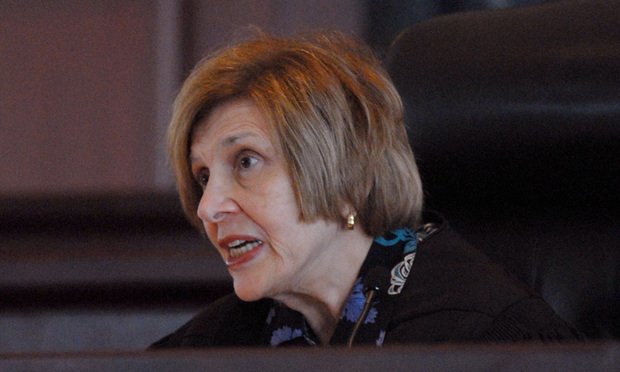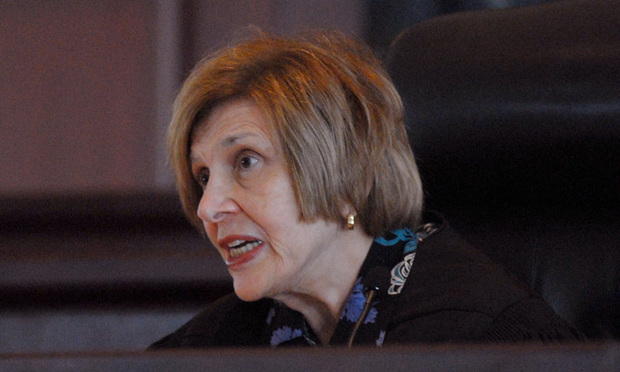
 Judge Rosemary Pooler of the U.S. Court of Appeals for the Second Circuit at a motion hearing June 26, 2012. Photo: Rick Kopstein
Judge Rosemary Pooler of the U.S. Court of Appeals for the Second Circuit at a motion hearing June 26, 2012. Photo: Rick KopsteinThe pastor of a California church may not sue Vimeo over its decision to delete his account after warnings that his postings violated the company’s policy against content that promotes gay conversion therapy, the U.S. Court of Appeals for the Second Circuit ruled Thursday.
A unanimous panel of the appeals court said Vimeo, the internet video services firm based in New York, was protected from the suit by Section 230 of the Communications Decency Act, which grants immunity to interactive computer service providers, like social media companies or video platforms, that make a good-faith effort to restrict offensive content.
The 1990s-era law has recently come under attack from critics, including jabs from former President Donald Trump, who claim that Section 230 gives tech firms excessive power to squelch political speech on their platforms.
But Judge Rosemary S. Pooler of the Second Circuit said, the statute’s impact on plaintiff James Domen’s lawsuit was clear.
“Vimeo is free to restrict access to material that, in good faith, it finds objectionable,” Pooler wrote in an 18-page opinion.
“Indeed, the fundamental purpose of Section 230(c)(2) is to provide platforms like Vimeo with the discretion to identify and remove what they consider objectionable content from their platforms without incurring liability for each decision,” the judge said.
Domen, who lead the California-based Church United, claimed in his suit that Vimeo’s decision amounted to discrimination against his sexual orientation and religion under state and federal law. A self-identified “former homosexual,” Domen publicly promotes conversion through his church, and posted videos to the organization’s Vimeo account advocating for the use of the controversial practice, which has been outlawed in several states.
Vimeo, a Delaware corporation, told Domen in 2018 that the posts violated its policy against “sexual orientation change efforts,” and warned that it would delete the church’s account if he did not remove his videos.
A Manhattan federal magistrate judge dismissed the lawsuit last year, finding that Vimeo was immune to the suit under Section 230. Domen’s allegations of bad faith against Vimeo, meanwhile, were too conclusory to “nudge their claims across the line from conceivable to plausible,” the court said.
On appeal, Pooler agreed with the trial court’s analysis, noting that the punishment was directed at content the pastor had posted, and not at Domen himself. Section 230, she said, does not proscribe specific punitive steps that companies are required take, and publishers have “significant subjective discretion” to determine what they consider to be objectionable.
“Appellants’ bases for arguing that Vimeo acted in bad faith are not 14 commensurate with how courts interpret bad faith in this context,” Pooler said.
She was joined in the decision by Judges Richard C. Wesley and Susan L. Carney of the Second Circuit.
Michael Cheah, Vimeo’s general counsel, said in a statement that the company was “pleased” with the decision.
“It affirms our ongoing efforts to keep Vimeo a safe and inclusive place on the internet, and we will continue to be diligent in removing content and accounts that violate our terms,” Cheah said.
“There is no place on Vimeo for content that is in any way discriminatory or hateful,” he said.
Attorneys for Domen did not immediately respond Thursday to requests for comment.
Domen was represented by Nada Higuera of Tyler & Bursch in Murrieta, California.
Vimeo was also represented by Cheah and attorneys from Jassy Vick Carolan in Los Angeles.
Read More:
2nd Circuit Revives State AG’s Lawsuit Against Anti-Abortion Protestors
2nd Circuit En Banc Rules Manslaughter as ‘Categorically’ Violent, Including Cases of Omission
Class Attorneys’ Handling of Witness List Warranted Decertification, 2nd Circuit Rules